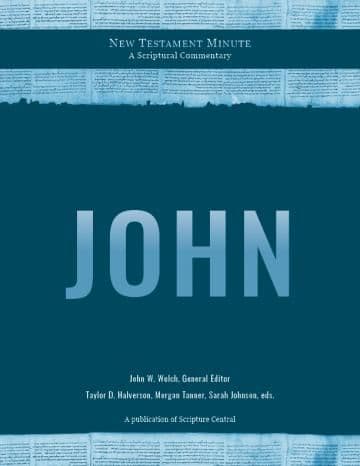Book
19 Chapters

This prayer, often called the Intercessory Prayer or Jesus’s High Priestly Prayer, occupies the entirety of chapter 17. The prayer can be roughly divided into three sections: in the first, Jesus prays for Himself; in the second, He prays for His disciples; and in the third, He prays for all who believe. This structure has evoked, for some, the order of the rituals of the high priest on the Day of Atonement (Leviticus 16:17), wherein he offers sacrifice for himself, for his house, and then for all Israel. Given that Jesus is about to offer an atonement for all humanity, this is an appropriate comparison.
The Gospel of John uses the word “hour” (Greek hōra) to indicate the moment of Jesus’s suffering and death, and we now see that the process has begun. “Glorify” (Greek doxazō), too, has similarly final connotations in John, so we may see this as a request for the Father to complete the divine plan and bring it to its intended end. Jesus’s comment that He “has finished the work” given Him by the Father is puzzling since He is only beginning to offer His great and eternal sacrifice. Perhaps He is referring only to His ministry, or more likely He is “speaking of things to come as though they had already come” (Mosiah 16:6). Jesus’s fidelity is unimpeachable, and the assurance that He will fulfill His promises is certain. Yet His work upon the earth will not be complete until He declares from the cross in triumph, “It is finished” (John 19:30).
Nowhere is it clearer than in John 17:3 that eternal life is more than the simple perpetuation of existence. Eternal life is to live as God lives. It is not just to know about God but to know and commune with Him intimately. God is the ultimate giver of life, and as we deepen our relationship with Him, we come to share in His glorious existence.
Note that as Jesus is now addressing the Father, His language is no longer of “going” but rather of “coming.” He is still concerned for His disciples because great persecution awaits them and He will no longer be physically present to shepherd them. But He does not request that God remove them from these circumstances. Rather, He prays that they will be protected in their mortal sojourn. Their presence in the world will allow others to come to believe as they have. The world will be redeemed and sanctified by those it has hated.
Similarly, we may wish that we be spared from trials, but sometimes God’s larger plan requires us to endure and continue in these circumstances, both for our sakes and those of the people around us. We may, in these situations, “be the means of bringing salvation” unto others (3 Nephi 18:32). We should not waste away our time upon the earth wishing for our mortal sojourn to be over. We have a work to do in mortality.
Finally, Jesus prays for all who believe, including and especially those to whom He has not personally ministered. In a sense, we can consider this portion of the prayer as especially pertinent to us since we are disciples of Jesus Christ who were converted not during His mortal ministry but rather “through [the] word” of His authorized servants. As Jesus prepares to offer His great and eternal sacrifice, His thoughts are upon all of us.
This section of the prayer can also help us to understand the nature of the relationship between Jesus and His Father. Jesus prays that the same sense of unity that links the Father and Son also be present among all Christian disciples. Thus, we can understand this unity among Christians to be powerful and palpable but not actual, physical oneness. All who know the Father and remain in His love are invited to join in this unity. The glory of Jesus, and true knowledge of the Father, is manifest unto them, though the rest of the world remains ignorant.
Book
19 Chapters
Items in the BMC Archive are made publicly available for non-commercial, private use. Inclusion within the BMC Archive does not imply endorsement. Items do not represent the official views of The Church of Jesus Christ of Latter-day Saints or of Book of Mormon Central.